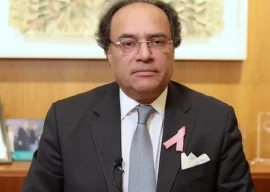
The terminal is capable of handling four million tons of dry bulk cargo per annum, and with an average discharge rate of over 1,000 tons per hour, the cargo handling time at this terminal will be a third of what it takes today at other bulk cargo terminals in the country, explained Rana.
The total investment of the project is Rs10 billion, of which Rs9 billion has already been spent on the terminal facilities. The financial close of the project was in July 2008 whereas physical work started in September-October 2008. The scale of the project meant that a consortium would be required to execute it successfully, added Rana.
FAP is a joint venture between Akbar Group and Associates and the Fauji Foundation, while Portia Management Services (part of the Peel Ports Group, UK) is responsible for the operations and maintenance of the facility.
This is the first automated bulk cargo terminal in the country since all other automated terminals currently handle only containerised cargo. The automation not only reduces handling time, but will also decrease wastage of grains and fertiliser during handling and their infestation with external particles during storage.
The terminal hosts storage facilities of about 100,000 tons comprising 74,000 tons of silos, between 20,000 and 30,000 tons of bulk fertiliser storage (depending on the product) and about 6,000 tons of other warehouse storage for grain and cereals.
The dedicated terminal is up to 15.6 meters deep and capable of handling ships of up to 75,000 tons. “The terminal operates more speedily, efficiently and reliably than the manual ones,” Rana said.
Outlining the process, Rana explained how machinery, imported from Belgium, will extract grain and fertiliser from bulk cargo ships and transfer it directly to 100 feet high silos that have been imported from the United States.
Later, the imported grain and fertiliser will automatically be transferred from the silos to bags. FAP intends to completely eliminate the use of bags in the future, instead transferring the grain from silos directly to flour mills using trucks.
On the choice of location, Rana said that while Karachi Port has more berths, it offers limited storage capacity. Gwadar, which has ample storage facilities, is otherwise ill-equipped for such a terminal and the lack of rail connectivity with the rest of the country adds about Rs2,000 per ton in transportation costs, he added.
Port Qasim, therefore, was selected not only for its proximity to Karachi, the financial hub, but also due to its linkage with the rest of the country through the National Highway, both of which would help reduce costs for importers.
Published in The Express Tribune, October 17th, 2010.



































1714129906-0/Clint-Eastwood-(1)1714129906-0-270x192.webp)






COMMENTS (1)
Comments are moderated and generally will be posted if they are on-topic and not abusive.
For more information, please see our Comments FAQ